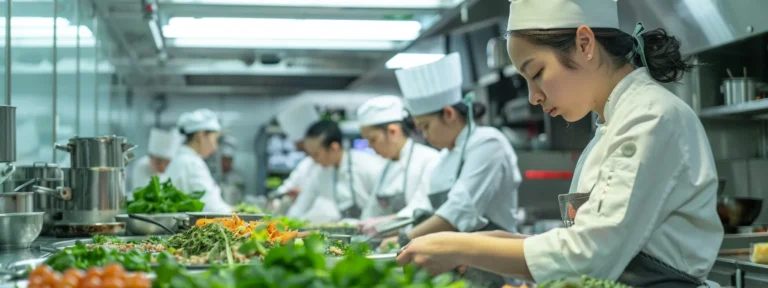In recent years, the shift towards plant-based diets has transcended the boundaries of personal health choices and entered the realm of professional culinary education. As more individuals seek out sustainable and health-conscious food options, the demand for skilled chefs in the art of plant-based cuisine has soared. Culinary institutions are now rising to the occasion, training a new generation of chefs who are dedicated to plant-forward cooking. These schools are not only altering the professional landscape but also influencing the dining habits of society at large. Keep reading to explore how these institutions are weaving green threads into the culinary tapestry.
The Rise of Plant-Based Culinary Education
The burgeoning interest in plant-based diets has been mirrored by a significant uptick in the establishment of plant-based culinary schools. These innovative programs are transforming the culinary education landscape by integrating traditional techniques with an emphasis on plant-based ingredients and nutrition. Students are taught to create dishes that are both visually appealing and nutritionally balanced, without relying on animal products.
Such courses often emphasize the use of whole foods and stress the importance of understanding the origin of ingredients. For students, this knowledge underscores the connection between farm and fork, and highlights the ethical considerations of food production. Dedicated plant-based culinary programs delve into the subtleties of flavor and texture that can be achieved through plant-based cooking, challenging long-held notions that meat is the centerpiece of fine dining.
Established chefs are also seeking out continuing education opportunities to stay current with this shift in consumer tastes. Many traditional cooking schools have incorporated plant-based classes into their curriculum, recognizing the importance of versatility in a chef’s skill set. Catering to this new interest, New York plant based culinary schools offer specialized classes that equip chefs with the tools needed to excel in this burgeoning field.
Inside the Kitchen: A Look at Plant-Based Culinary Curriculum

The curricula of plant-based culinary schools are diverse and comprehensive, encompassing far more than just basic cooking techniques. Students delve into the science of food, exploring how different cooking methods can affect the taste, texture, and nutritional value of plant-based ingredients. The theory behind food pairing, seasoning, and creating balanced meals is also a critical component of their education.
With a strong focus on innovation, these programs encourage budding chefs to experiment with unconventional ingredients and to develop new culinary techniques. This might include working with plant-based meat substitutes, dairy-free cheeses, and novel sources of protein such as lentils and tempeh. Such experimentation is crucial for keeping plant-based menus dynamic and appealing to a broad audience.
Success Stories: Alumni Transforming the Food Industry
The impact of plant-based culinary schools can be seen in the successes of their alumni, many of whom have gone on to make significant contributions to the food industry. Graduates of these programs are opening groundbreaking restaurants, launching innovative food products, and authoring cookbooks that challenge the preconceptions of plant-based cuisine. Their achievements are a testament to the versatility and creativity that a plant-based culinary education can inspire.
One such success story is the rise of plant-based eateries that have quickly become culinary destinations. Alumni at the helm of these restaurants are crafting menus that draw both vegetarians and meat-eaters alike, proving that plant-based dining can be both luxurious and mainstream. Their establishments are becoming incubators for change, influencing the restaurant industry at large.
The Role of Plant-Based Culinary Schools in the Future Food Landscape
As we look towards the future, it’s clear that plant-based culinary schools will play a critical role in shaping our food systems and palate preferences. Through education and innovation, these institutions have the power to influence not only what we eat but also how we think about food. Their continued emphasis on sustainability, health, and ethics suggests a shift towards a more conscious and conscientious food culture.
The reach of these schools extends beyond the kitchen and into policy and agribusiness, as their graduates become voices for change in various sectors of the food industry. As demand for plant-based options increases, these professionals will be key players in developing products and services that cater to a new era of conscious consumers.
Altogether, the evolution of plant-based culinary education marks a pivotal moment in the way we view and interact with our food. These schools are not only equipping students with the skills needed to thrive in a competitive industry; they are also laying the foundation for a sustainable, healthful, and ethical food culture that benefits all. Overall, the impact of plant-based culinary schools is profound, shaping a future where good food and good health go hand in hand.

